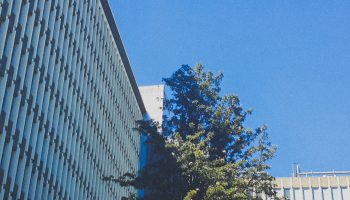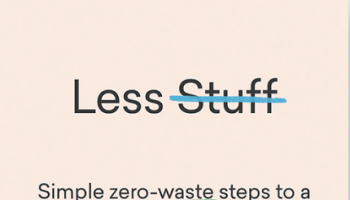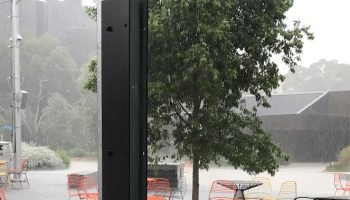What is your academic background?
Geography and environmental science is a passion of mine, even though I don’t have an undergrad background in it. I have had that portfolio for around eight years. Film and screen is a portfolio I got a few years ago and politics and international relations very recently – a matter of weeks. I have an Arts degree from Monash Clayton and I majored in English and History. I did a Master of Librarianship, and I just never left. Monash is an awesome place.
Could you tell me about your role as ‘sustainability representative’?
I liaise with the sustainability office, and there’s been a huge culture change in favour of having a bit of a ‘holistic’ view of everything. Infrastructure gets done internally, such as LED and solar panels; but it’s my role to encourage people to recycle more, and we’ve got compost bins and little rubbish bins on desks now, which amazingly reduces the amount of rubbish people throw away. Just trying to get people to be more responsible and do things like recycle their paper, print less, and laminate less as it makes it hard to recycle.
In regards to getting less physical books, and more online, is that to be more sustainable?
It’s not really about sustainability, mostly it’s a storage issue. We’ve dramatically reduced what we get in paper. We’ve got about a million books just at the Matheson. Constantly growing, there comes a point where you have to get rid of old, worn out things. We have an e-preferred policy and it makes things a lot easier for students to access, out on the lawns, at home, in labs, etc. It’s not always cheaper, but it is more accessible, so that is a big factor. Our numbers are constantly increasing. We have something like 800 databases, and thousands of journals.
Do you ever have the issue of not being able to find something for a student on the online library?
All the time. Particularly with researchers and post grads, so we have document delivery – previously known as interlibrary loans – where we borrow from other libraries for students, and where we will buy resources for students and researchers. Not for undergrads, but we do for postgrads.
You’re an academic librarian, how is that different from a “standard” librarian? How can you help different students across different disciplines?
There is not a big difference – most public libraries have access to very similar databases as we do, you just have to be a member of your public library. It’s possibly more predictable – we don’t have people coming in asking, how do you tell the sex of a guinea pig? It is more about assignments and after a while, if you get several students from the same unit, we contact the unit coordinator to see if we can run a class to cover that with the students. That way it’s more efficient and helpful and other students don’t miss out. We also offer essay writing and note taking classes and presentations, which public libraries don’t offer. We’ve only had those services for around 5-6 years. You try and work to fill the student’s needs.
A lot of students are just overwhelmed of the collections in the library – and people can be a bit scared of librarians and be scared of asking questions. What advice would you have for them?
I went through my undergrad not approaching a librarian. You think you’re an adult and you feel stupid for asking, but from our point of view there are no dumb questions. Once you’ve been shown how to do something, you’ll know, then you won’t need to ask again! We wouldn’t do this if we didn’t like helping people. We’re always passionate about it, even if we’re a bit grumpy sometimes because we deal with things all day long.
We tend to see mainly post grad and researchers [subject librarians] – the undergrads should go straight to the information point. If they can’t answer the question there, they will refer to the research and learning point where they can see one of us. The first ports of call are usually the catalogue, and then the library guides – which are available in a huge number of discipline areas. These may have unit specific information, special resources, course notes. Don’t be scared of the information point – that’s what they are there for!
What’s beyond the online catalogue and the bottom few floors? Can anyone look at anything in the library?
Anyone, even the general public can come in and use the collections and photocopy, although you have to be a staff or student to access databases. With the exception of the rare books collection, where you might have the Gutenberg bible which is 400-500 years old. We retrieve it for you especially in that case. We have comic books, Women’s Weekly issues, going back for decades which are classified as rare.
What sort of different things are in the library collections?
We have the biggest Jonathon Swift article collection in the southern hemisphere. Many colonial cookbooks, diaries, letters, correspondence, science fiction first editions and old volumes, such as a first edition of Aldous Huxley’s Brave New World for instance. We do run exhibitions (online as well). Outside of rare books – a huge Asian collection, a huge music collection, and specialist collections, like the medical collection, which is not just books but old instruments and things that look like torture devices, or the odd skull that has been collected by someone. Other libraries have different collections – Peninsula, being education focused, they have some really cool displays of things teachers might take on rounds, like giant abacuses and skeletons. We support everything that is researched and taught here. It’s not just databases and books and journals, it’s immersing yourself into a certain discipline.
How have academic libraries changed recently due to the Internet?
Before the Internet, you’d tell the librarian what you wanted and they’d write a whole big search strategy, do it for you and give you a print out. You had cards – author, set, subject, title…typed up and filed in cabinets and that’s what we would use. The early internet was still very limited, we didn’t have many databases as most of them came on a floppy disk which you would have to load onto the computer. You wouldn’t have a computer at home, so you’d have to come in and look on the 2 or 3 computers that we had. Before Moodle there was Blackboard which was not as good, most course notes were paper based – now it’s a balance between not having enough information and having too much. One of the hardest things is to learn to search efficiently. We used to take people to reference books. Databases were paper based, and people would search through newspapers and microfilm. It now takes 5 minutes what would have taken you half a day back then.
Is online or paper better, or both?
It’s good to use both – there’s still an awful lot not available online. You do need to dig under the surface on paper or out in the field. You can’t download rock samples from a computer, and there is no single perfect book in so much for what you’re working on.
How does one become an academic librarian or subject librarian?
My path was that I did my undergrad, then a Masters’ in librarianship, that gave me a foothold into a reference librarian position. I did a lot of casual work, some loans desk, some shelving and I landed this position by pure fluke. There’s not a lot of causual postions, but that is one way of doing it. I did the course here but they are also online and at other unis such as RMIT. Then it’s just finding a job in an academic library. People do swap between school, public and academic libraries. People find a niche for themselves. There are also librarians who do indexing and cataloguing. I don’t have a geography degree but that hasn’t stopped me from being a geography librarian. You immerse yourself in the job. It’s people who love a challenge and the challenge of finding unusual things. When someone comes up and asks you for something, it’s because they don’t know how to find it. I’ve had an academic ask me about birds’ nest soup.
Bird’s nest soup?
A soup they make from special birds’ nests they harvest in Java and Indonesia. [Finding sources] it’s not always easy – you get challenges thrown up at you. We sometimes look at Wikipedia as our first resource, so we can use words and references for searching so we have an understanding of what it might be. Don’t reference it for your essays, but do use it for that purpose!
The chase, the hunt of finding information, is that your favourite part of the job?
That, and a combination of helping people, which sounds dorky, but it’s true. We won’t give you the answer but we’ll show you how to get there, as well as give guidance on referencing and writing, after all it has to look professional… although, for an open day a few years ago Monash had a house-sized billboard on Wellington Road with a typo… That got sent to the printers and no one noticed.


